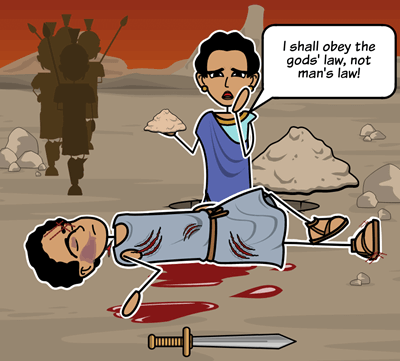

An argument ensues with Antigone claiming she was merely obeying the laws of the gods and that Creon will be punished. Scene 2: The sentry returns with Antigone who returned to the site of her crime to rebury her brother after the layer of dirt had been removed. There seems to be an underlying current of rebellion as evidenced by the sentry’s comment about the king’s conscience and Choragos' suggestion that perhaps the gods are punishing him. Creon cannot comprehend the crime could be done by a woman, hence the ironic statement to bring him the man. Scene 1 Analysis: Creon must establish the legitimacy of his rule and does so by establishing a no tolerance policy regarding the burial of Polyneices. Creon storms away in anger and orders the sentry to “find me the man!” His test comes immediately as a sentry informs him that Polyneices has been buried. His speech contains an extended metaphor calling Thebes a ship of state and that a king and his citizens must put the state above all. Scene 1 begins with Creon’s statement of political philosophy, that he does not expect complete loyalty from his subjects until he has been tested in office. Scene 1: Creon, the uncle of Antigone, has claimed the throne on account of Eteocles' death. The fact that Antigone acts alone against the wishes of the king and against the social customs that considered women inferior, makes her more heroic. Although it’s possible Antigone recognizes Creon’s political treachery, she probably helps Polyneices for the reason she gives: it’s the right thing to do. When his year is up, he decides he likes being king (with a little influence from Uncle Creon) and does not abdicate the throne.Ī Civil War ensues. Prologue Analysis: Upon the death of Oedipus the King, his sons Eteocles and Polyneices are to rule in alternating years. Antigone and Ismene discuss Creon’s decree that their brother Polyneices will not receive a proper burial and anyone who tries to bury him will be put to death.Īntigone informs Ismene that she will defy the law and give Polyneices burial rights the dead deserve. The Prologue: Eteocles and Polyneices (Antigone’s brothers) have killed each other in battle.

Creon also must relent in scene 5 although he does not want to. She is torn between following her conscience or following the law. Self - Ismene initially decides to not help her sister, yet claims responsibility afterward. The Supernatural - Antigone’s family (and the city of Thebes) has been cursed by the gods. Creon also argues with his son Haimon and Teiresias. She also battles her sister Ismene, who attempts to persuade Antigone not to bury her brother.

Person - Antigone battles Creon, insomuch that he represents the state. Not only is she battling Creon, who decrees Polyneices should not be buried, she battles the social customs of the time that assumed women were the weaker gender and, therefore, unfit for politics. Society - Antigone fights the establishment in order to expose an unjust law (an ancient appeal to Natural Rights).

Understanding the major conflicts in Antigone is necessary for understanding the play. In Antigone, the gods punish Creon for enacting unjust laws. The gods intervene, usually to punish the tragic character.Fate plays a major role in Greek Tragedy.Antigone understands her fate from the beginning. Creon gets the edge as tragic character insomuch that he recognizes his foolishness too late. They are both of noble birth they are both proud they both endure a mighty fall. The play’s title indicates that Antigone is the tragic character the plot of Antigone, however, indicates that Creon is the tragic character. A tragic character is of noble birth and endures a mighty fall on account of pride.


 0 kommentar(er)
0 kommentar(er)
